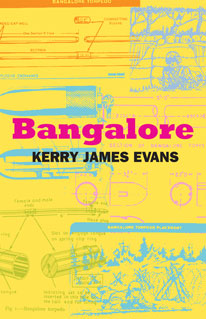Dec
5
2013
Mar
1
2013
Featured Poet: March 2013 Vol. 5 # 6
classid="clsid:38481807-CA0E-42D2-BF39-B33AF135CC4D" id=ieooui>
Nick Ripatrazone is the author of four books: Oblations (prose poems, Gold Wake Press), This Is Not About Birds (poems, Gold Wake Press), The Fine Delight: Postconciliar Catholic Literature (literary criticism, Cascade Books) and This Darksome Burn (novella, firthFORTH Books). His criticism appears regularly at Shenandoah, Pleiades, Iowa Review, Colorado Review and HTMLGIANT. His writing has received honors from Esquire, The Kenyon Review, and ESPN: The Magazine, and has been featured at Verse Daily.
This is how you remove a hook
from a trout: smooth your hand down
like petting the fish, and then squeeze
so the mouth opens, like a door.
Not that you would squeeze a door,
Rachel, I am talking about the action
in different ways, since I know
you do not always like these trips
(early morning, the rubber
of waders against thighs,
claustrophobia in the current)
and I want you to know
I appreciate your participation,
but, really, that trout will die
unless you learn to move
with a mixture of speed and care.
Catch is less important than release.
Sisters of Mercy
Beneath a 1986 Chicago Bears
sweatshirt, thermals, and bleached
Polo dress shirts, I found
a folded nun’s habit.
I lifted the habit and the fabric
settled down, brown and full.
The white coif was a bit wrinkled.
I searched the box for a rosary
but only found costume necklaces.
A woman stood behind a table,
bills stuffed into a fanny pack.
Could this be? Might she
have gone from convent to cul-de-sac,
traded morning prayers and early supper
for Pilates and PTA? I wanted
to ask, but someone tried to barter
the price of a butter plate. The owner
said absolutely not: all prices firm.
Nothing left to interpretation.
This Is Not About Birds
We followed molted feathers toward the corner of the barn
where a swallow’s coffee-colored, cup-shaped nest sat
in the rafters & small, sloped heads of nestlings rose & fell.
Outside they fluttered while scuttling along the shingles &
then swooped overhead; forked, cream-spotted tails shuttering
through wind. Yesterday a lone bird stooped over the wobbling
blades before rolling away, & we followed the swoop
until it rested on the roof & promised that one day it would be
on our table, center gutted, a prize for us to eat.
*
So we stuffed into the pickup, NRA stickers worn to beige, &
fired wayward shots to rouse the swallows from their nest &
we spun through the field, tires toughing it out but we shook
while keeping our rifles out the window. Waiting. None of us
had ever shot anything before (anything that moved/breathed/lived)
but it was as good a time as any.
*
Was there ever a time that was not as good as any other times?
Was this decided by a certain group of people?
Was there a list of times that were good, & times that were not?
Was this the result of a comparison or a singular observation?
*
This poem should (must) end with a death. So here it is:
I, or someone with me, as we have formed a collective, raised
a rifle, waited for the swallow to spread its wings, be full-formed.
Then breathed. Then shot, a single fire, & so accurate
that the swallow dropped, wings collapsing onto the hollow
belly. Such a thing to steal flight from something. Such a
shame.
An American Werewolf in London
Six hours of early Depeche Mode in Ms. Gabriel’s Saab
was worth it to see my brother play college football.
No one knew he was dating my geometry teacher.
My parents were de-flooding our basement
so I hitched a ride and listened to her claim
that Wade was more mature than most men,
let alone other college sophomores. She brought two cases
of water bottles and pointed at each Whole Foods
we passed. I explained the rules of football
and she told me that academics were more important.
I liked bottle rockets, Def Leppard, and two-point
conversions, and watched Wade barrel through
the line while people asked if I was his son.
Afterward the teacher wanted to go out, so Wade
told me to watch a horror movie and said to close
my eyes during the bad parts. The teacher
said she trusted me to do the right thing.
Santo Domingo
Four on the pickup bed, red
shirts flushed from wind, hands
in back pockets & we follow
them past the boys shooting
at the dark backboard, ball
not bouncing but slogging.
We park at the market where
cattle hang upside down, gutted
& draining into milk cartons.
We step over the heads of bulls
& flies tickle our calves. Velocidad
maxima: men in sandals & ripped
jeans hold hands, leaning against
the pocked walls, Styrofoam cups
pitted in the holes. Carlos
walks us past them & shakes
one’s hand, skin lingering on skin,
& I kick aside bottles of Presidente
while the brothers of his lover sit
behind a sign with a white woman.
Where is he, Carlos asks, hand
on the rock (Esteban is an officer
& sets brush control fires
on the roadside–in the only photo
Carlos has ever shown of him, he
is pissing in the fire). The brothers
raise their shoulders & say,
in words I only half-understand,
what’s gone today is gone forever.
Feb
1
2013
Featured Poet: February 2013 Vol. 5 # 3
classid="clsid:38481807-CA0E-42D2-BF39-B33AF135CC4D" id=ieooui>
A native of Ithaca, New York, Luke Johnson is the author of the poetry collection After the Ark (NYQ Books, 2011). His poems have appeared or are forthcoming in Shenandoah, Southwest Review, The Southern Review, The Threepenny Review, and elsewhere. He is an Associate Poetry Editor at storySouth (www.storysouth.com) and a graduate of the writing program at Hollins University. He lives in Seattle, Washington. (personal website)
Above Oxbow Dam
Rupert, Idaho
Even the gas stations are beautiful
in Rupert, but not for the obvious reasons.
in Rupert, but not for the obvious reasons.
Not the Snake River feeding
reservoirs that feed automatic waterers
reservoirs that feed automatic waterers
sputtering arcs over potato crops
yards from the diesel pumps,
yards from the diesel pumps,
not ranges clawing the horizon
like distant kingdoms of thought.
like distant kingdoms of thought.
Not the woman with her grandson:
him crouched next to a truck-sized puddle
him crouched next to a truck-sized puddle
swatting gravel at brown water,
her tugging him back by his overall-bib
her tugging him back by his overall-bib
when he edges too close. A man
in a patchwork leather coat
in a patchwork leather coat
tapping ashes on the bars of his Harley.
We’re not here together, mostly.
We’re not here together, mostly.
It’s a tale the land is telling: we are
momentary, always on the verge drawn
momentary, always on the verge drawn
both ways. It’s the fisherman,
one week earlier, sucked back from his raft
one week earlier, sucked back from his raft
into a diversion dam. The water there
stays deep and dark. It is feeling only.
stays deep and dark. It is feeling only.
It is the place running over itself.
*Appeared in New England Review
Shooting Below the School Building
Holy is the muzzle-flash, the blood-speck
on my thumb’s knuckle where my hand met
the gun’s recoil above hoof and paw prints
tracing snow, thickening only to disappear.
Earth held ice around us. No halo here
but trigger-guard, no prayer but aim.
The iced creek—where our students escaped
to grope or smoke, hiding joints
in a stone-sunk ammo-can—gurgled
its small life. We left their stash and kept
its small life. We left their stash and kept
shooting bottles. The art-teacher (his guns) told me
Our kids plain don’t care: when in Pennsylvania
Our kids plain don’t care: when in Pennsylvania
five young girls died, a grown-man killing
in a one-room school, one of our students joked,
some laughed. You can’t teach against that
sort of senselessness, he said, bracing.
sort of senselessness, he said, bracing.
One of the girls, speaking only German,
did escape, not understanding
the shooter’s words, but running
to a nearby farm while others offered to die
to a nearby farm while others offered to die
hit much, but kept reloading, stripping gloves
and fixing rounds to chambers, tossing
my spent shells into the creek. No balm
but repetition: fire and re-load, like writing
but repetition: fire and re-load, like writing
words on a blackboard until they’ve lost
meaning, not glancing backwards, but trusting
meaning, not glancing backwards, but trusting
the hand to spell each sentence the same.
*Appeared in Hayden’s Ferry Review
Summer Service
Do not pity him. Do not treat him like furniture.
Robin, the autistic boy from the congregation
who liked to watch our ceiling fans go.
Talk. He’s a boy. He seemed less
fixed on revolution, searching instead
behind the blade, the space for an instant
behind the blade, the space for an instant
obscured then revealed over and over, knowing
he’d seen the blank ceiling-patch before,
but believing it could change, or just liking
its blankness, the communion between boys
its blankness, the communion between boys
and what seems like magic. I would find him
Sundays after sacraments: neck craned back
Sundays after sacraments: neck craned back
feeling the blades change speeds, and as the wicker
sank in the blade’s middle, Robin soon
sank in the blade’s middle, Robin soon
came less, as if the fans were a miracle
disproved, a once great prizefighter
disproved, a once great prizefighter
swinging at ghosts. He will leave
and we will move. The fans gutted or left
and we will move. The fans gutted or left
as decoration, a relic of hot days after prayer
when the fans spun impossible, and boys loosened
ties as if all they needed to believe was air.
*Appeared in New England Review
Wedding Night that Wasn’t, with Thunder
Surely, in this other life
we would have let the filament sour.
Rain: the forest-rustle turns drone: a sound
that goes with emptiness, deep and hollow.
Inside my tent is damp.
A spider restrings its web
beneath the rain-fly. I’ll watch it work
again, knowing its venom
and quiet, knowing it continues
despite me. In the morning
I’ll clear her spun web.
Inside my tent is damp.
A spider restrings its web
beneath the rain-fly. I’ll watch it work
again, knowing its venom
and quiet, knowing it continues
despite me. In the morning
I’ll clear her spun web.
*Appeared in Quarterly West
Apr
1
2012
Featured Poet: April 2012 Vol. 4 # 6
classid="clsid:38481807-CA0E-42D2-BF39-B33AF135CC4D" id=ieooui>
As founding editor of Many Voices Press, Lowell Jaeger compiled Poems Across the Big Sky, an anthology of Montana poets, and New Poets of the American West, an anthology of poets from 11 Western states. His third collection of poems, Suddenly Out of a Long Sleep (Arctos Press) was published in 2009 and was a finalist for the Paterson Award. His fourth collection, WE, (Main Street Rag Press) was published in 2010. He is the recipient of fellowships from the National Endowment for the Arts and the Montana Arts Council and winner of the Grolier Poetry Peace Prize. Most recently Jaeger was awarded the Montana Governor’s Humanities Award for his work in promoting thoughtful civic discourse.
Grandma’s Last Christmas
Grandma still lit candles on her Christmas tree
instead of stringing lights, and Dad said we’d better
help her take the damn thing down before
the old homestead burned to the ground.
Easter Sunday after church, we drove over
and found Grandma in a chair pulled close
to the soaps flickering on her new TV.
He done it, she said. I seen him.
She pointed at the black and white screen,
her house coat buttoned askew,
her thick ankles crushing her fuzzy slippers sideways.
That’s him, she said. He’s the one.
We raked buckets of dried needles, scraped lumps
of candle wax off the floor. Dad unscrewed the trunk
from its stand and heaved what was left
out the backdoor, trailing more needles and wax
and all us kids sweeping up behind him.
It’s just a show, Dad shouted from across the room.
It’s pretend. Grandma pulled her specks
lower on her nose and smoldered.
I know what I seen with my own eyes,
she said. We each had to hug Grandma
before we could go though she never hugged back.
The room felt empty where the tree had stood.
Dad bought a round of ice cream cones
at the drive-in on our way home, and we savored
in silence, letting the cold melt on our tongues. Dad stared
ahead, shuddered and mumbled. We didn’t dare ask what.
Things Got Worse
Things got worse before they got better
after the mill shut for good
a week before Thanksgiving. Dad
was up early with no place to go.
He’d sit with his coffee and stare
straight ahead like a blind man.
We’d come home from school and find him
still there. Then it snowed and snowed;
the roads drifted closed, trees snapped
curbside and lay broken like wounded soldiers.
Dad shouldered his shovel door-to-door
asking for work clearing drives and walks.
A nearly grown neighbor boy did the same.
We’d report to Dad whenever we spotted the boy
slinging snow near streets Dad claimed
as his own. He don’t need it bad as I do,
Dad said. He’d pull on his boots and march
off to see what’s what and set the boy right.
A week before Christmas Dad took a job
delivering bottle gas, and he let us ride along
to see the Christmas trim on big houses
across town. Or we’d slip and slide
county backroads delivering to farms.
A big man in coveralls loaned us an ax
and we cut a Christmas tree from his woodlot.
Not much of a tree. Dad lashed it
to the grille of the truck and pieces flew off
as we sped along, our snow boots caked
with manure, our noses pinched
against outhouse smells in the heat of the cab.
At least we got food on the table, Dad said
whenever Mom looked like she felt sorry.
Or he’d say, There’s hungry people in this world
who get on with a lot less. Which meant
we should eat what Mom dished and not complain.
Strangers
A classmate came knocking
one hot summer afternoon.
He’d hiked clear across town
in a trench coat and sandals
and nothing more. These were days
of Jimmy and Janis, make love
not war. We did crazy things.
Mom let him in; I wasn’t home.
Mom worried strangers might be Jesus
in disguise, testing her. I guess
Jesus did crazy things too.
He said Mom had served him
milk and cookies. We laughed
and made fun of her. Neither of us
meant it; we were young and hopped-up
on mock and ridicule.
Mom said they’d had a nice visit.
He’d talked about dropping out, Mom said,
and she hoped he wouldn’t do that.
He’s a bright boy, Mom said.
His big brown eyes just melted her
heart, she said. And his smile,
so gentle and full of forgiveness.
LSD
We tied twisted plastic wrappers
to the rafters. Lit them one by one,
awed by the dripping flames hissing
and sizzling in the dirt. Dozen guys,
half as many chicks, huddled
in a picnic shelter, Iron Butterfly
drumming a war dance on the eight-track.
The molten globs of plastic shrieked
when they let go and whistled
like bombs. Last year of high school,
first frost on the meadow, full moon.
Faces flashed bright in the flames,
then black. Faces flashed
bright in the flames, then black.
Across the world an orange robe
doused in gasoline set itself ablaze
on a busy intersection, broad daylight.
One of us made noise like gun-fire.
Don’t do that, one of the girls said.
Something moved in the shadows,
something in the dark crept closer.
Napalm them jungle niggers, someone said.
We laughed and dared the dangerous
big world out there
to dare us back.
Action
Action speaks louder than words, Lenny
reminded us. We’d just walked home to the dorm
from a rally on the commons,
spitting bullets at Nixon and his war.
We huddled and passed a pipe. Lit candles and aimed
a black-light at Hendrix ghosting on the wall.
Don’t you just want to trash something?
Right-on, Ted said and raised a clenched fist:
Smash the state! Right-on, Man. The rest of us
agreed. It’s revolution, Man. Love Generation rules.
We passed the pipe again and chased it
with a bottle of Boone’s Farm. Larry
went teary-eyed. Think of it, he said,
it’s up to us. We’re like what’s-his-name Jefferson,
Abe Lincoln, Man. We’re . . . like
making history, Man. Let’s do it, Lenny
shouted and jumped up on his chair. Do it, Man!
“Something’s happening here”—we sang along
with the stereo. We’re like a movement, Man. We’re like . . .
a tidal wave, Ted said. We’re like . . . .
Someone had sent ‘round a few crumbs of hashish
smoldering on a tinfoil wrapper. We’re like . . .
but he coughed and coughed and couldn’t force
another word. You’re like wasted, Man, Larry said.
It’s cosmic, Man, Lenny said. Don’t you see?
It’s all atoms. Everything. All made up of atoms.
All we need is . . . like . . . unlocking that atom, Man.
Ted snored. Larry rolled himself up in a rug,
knocking an empty, spinning. The needle on the LP blipped
on the last groove over and over. Ticking like a bomb.
No, ticking like a countdown. No, ticking like a clock.
Mar
1
2012
Featured Poet: March 2012 Vol. 4 # 5
classid="clsid:38481807-CA0E-42D2-BF39-B33AF135CC4D" id=ieooui>
Kevin Boyle grew up in Philadelphia and now lives in Burlington, North Carolina. His book of poems, A HOME FOR WAYWARD GIRLS, won the New Issues Poetry Prize in 2004, and his chapbook, THE LULLABY OF HISTORY, won the Mary Belle Campbell Poetry Book Publication Award in 2002. His poems have appeared in Greensboro Review, Virginia Quarterly, Michigan Quarterly, Poetry East, Denver Quarterly, North American Review, Colorado Review and Antioch Review.
Approaching Sixty
The plaza in sun-stroke, the men tied to palms
Whose branches they lop, he walks through
The dream to her steps and finds her still
In mourning, saying, come back in a year’s time,
My love, then invites him in, touching
His face to find out who he is, a recurring touch
For thirty years, and then gone, not the memory
Exactly, just the dream. A blessing not to wake
Without her, the black lace, the red in her hair
In her lips as well, the welcoming smile saying
Tengo las cosas muy claras, because everything
Makes sense to her now. And a blessing
Not to be turned away and find himself lost
In the two-block red light district where dwarves
And the deformed make small talk with
The sex buskers, the women raising their skirts
To show him their black mantillas they lift
To show him their hair, black and pomaded.
The two scenes arm in arm for years until
Finally he realizes he hasn’t dreamt of her,
Of all of them in years. Even in his dreams
He’s forgetting, leaving the exotic traces behind.
In the Deep Heart’s Core
Timmy was too kind to say no, despite the flooding
That winter, as always, the shite the road threw up
Even before it gave up on being a road, the students
Waking from their sleep to yawn and bitch about
The poor conditions of the mud lane, the brambles
And gorse scratching up and into the sides of
Timmy’s coach, even at the windows to frighten
The bejesus out of one slow, deeply hungover waker
As I took the mic to announce we were about to alight
For a view and snap of Yeats’s Inishfree, perhaps even
A class photo, with Inishfree in the distance, our heads
Surrounded by Lough Gill, our feet planted in muck
We’d bring back to Timmy’s coach, if Timmy
Would be so kind. We saw the island, “kind of puny,”
One student said, and another, “It’s a little fucking nothing,”
And then turned to arrange ourselves for Timmy
Who was still working the coach back and forth
To escape the trap that was the carpark, finally
Emerging in a lather, and though I thought to hand him
My camera for the group shot, all twenty-eight students
Handed him their cameras with quick directions,
And so with a few cameras on the ground, and the rest
Like bangles up and down his sweaty arms, he took
What felt like a thousand wedding photos, all of us
In fine mettle, the students and I smiling immeasurably,
As if at peace, the water birds flying away from us
Out of the rushes, the little bits of trash we dropped
Floating in the wind that put color in our cheeks, forced
The lake water to lap near our feet and take the one
Styrofoam cup someone had accidentally let slip
Out toward the mysteries of heather island.
I sometimes drag the photo out of my iPhoto folder
And realize I can’t remember a single student’s name
Because it was over a dozen years ago and Timmy,
I learned, is long dead, and though I seem to forget
Almost everything, I do remember his prescient words
As we left the lake. Never again, I’ll never again
Take you eejits down that fucking Yeats lane.
University Dreams
When I tell my daughter I only spent one Friday night
on campus when I was in college, she seems so saddened
by my loss I love her even more. At sixteen, she hates
school and is eager to go to college where she imagines
every Friday night will be filled with ecstasy, not the drug,
just the feeling, and Saturday night as well, perhaps Sunday.
She doesn’t mention Monday through Thursday much.
When I tell her I lived at home and took the bus and el
that left me off six blocks from my first class on Astronomy
taught by a man whose accent was from another galaxy,
she asks about Friday nights, Saturday, and I tell her everything
about the supermarket, how there were cash registers
to punch and no scanners, and they hadn’t invented the blood absorber
so all the meats bled as if freshly slaughtered, and how
once, during the five years, the Retail Clerks International
went out on strike, which meant I could be on campus
on a Friday night, even Saturday morning, before I had to return
to picket. And did you make up for lost time, she asked?
It was so long ago I can’t remember everything, except
that feeling of being alone and walking alone along fraternity row,
all the parties in full bloom, each house surrounded by a moat
of people, smoking and drinking, and then meeting, somehow,
a girl from Astronomy coming back from the library, Jewish,
both parents doctors, from Westchester. I told her my mother
was from the Bronx and, somehow, she invited me in
for a drink, and then—such a dark horse—to stay the night.
At that time I believed in half-hearted class war, and so felt
oppositional, and I was terrified of her, her openness,
her license, her black hair. And by Tuesday we had won
concessions, the strike was over, and I was back standing up
in my apron, blood here and there, kind of comforted
by the inhibitions, the tamping down, knowing that soon
would come the ecstasy, and I wasn’t far from wrong.
Why Sleepless
My mother told me not to fall asleep without
saying a decade of the rosary, and her mother
told her not to sleep with flowers in the room,
and a Russian caregiver told my parents to sleep with
the window open an inch or so in winter, and my brother
told me to sleep on my side of the bed or else
the wrath of Cain would come down upon me,
and my dog sleeps in a locked crate, and my mother-in-law
mentions the heat, how she can not sleep with
too much or too little heat since her husband died,
and my wife, when she sleeps, talks in her sleep
about the men who are pursuing her with knives
or with flowers, she’s never sure which, or she’s lost
her leather purse and men she has slept with
find it, dump everything in the grass, and fling
the purse deep within the long woods she can’t even see
for all the brush fires held against her eyes.
Seems to Teach
It is only during the eclipse that the moon takes
A lover, finding some other floating stone to hold
Close to her, some with dimples, some with the pox,
And as the world below her watches the magician’s cape
Cloud her over, the moon is at her antics, making love
Without arms or legs, all brain becoming quickly
All womb or all heart, she tells them. They’re at it
For an hour or so, having to part only as the sun begins
To light up their edges, the moon waxing poetic
About her moodiness and need again for privacy, solitude.
The rock begins its drift and the moon remains inviolate,
The virgin goddess beloved by all the lonely on the faces
Of the earth. She knows she is watched, and in the way
Parents teach children how to die, when the time comes,
She seems to teach the single, the solitary how to endure
With panache, with subtle shifts, the bright white loneliness.




